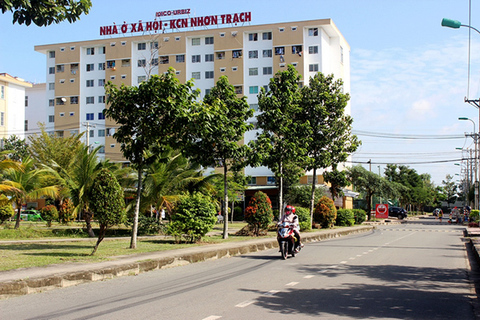
A social housing project for workers in Dong Nai Province. — Photo cafeland.vn
The southern province of Dong Nai solicited investment in building houses for low-income earners, heard at a conference on Wednesday.
Speaking at the social housing investment promotion and development conference, Vo Tan Duc, deputy chairman of the province People’s Committee, said despite his administration’s focus on social housing for low-income earners, supply has yet to meet demand.
The province has 31 industrial parks with 410,000 workers, who require accommodation, he said.
There would be more IPs, further increasing the need for workers' housing, he said.
According to the Dong Nai Confederation of Labour, the province has over 1.2 million employees, mainly migrants from other parts of the country. Therefore, the demand for accommodation among them remains huge. Most of the workers rent boarding houses in residential areas near industrial parks.
The province targets building 10,000 houses in 2021-25 at a cost of nearly VND10.2 trillion (US$441.8 million), with the funds coming from public resources, private enterprises and others.
Nine projects are being developed on an area of more than 52ha with more than 8,000 houses.
At the conference, the province called on local and foreign companies to invest in 37 worker and social housing projects with a total area of over 175ha, mainly in Bien Hoa City and Nhon Trach, Long Thanh, Trang Bom, and Vinh Cuu disctricts to partly meet the need for low-cost housing, especially from workers, he said.

Secretary of the Dong Nai Provincial Party Committee Nguyen Hong Linh exchanges information with businesses on the sidelines of the conference to solicit investment in social housing projects on November 15. — Photo nhandan.vn
Speaking at the conference, Secretary of the provincial Party Committee Nguyen Hong Linh said “Many commercial housing projects have been built, but there are not many people living in there, while workers live in substandard boarding houses. Demand for housing is still huge in the low-income segment. The economic value of this segment is not as high as that of the commercial housing segment, but investors still make a profit besides the great social value they bring.”
More than 700,000 workers live in boarding houses now, he said.
The province invites businesses who have the resources and experience to invest in housing projects with good quality and reasonable prices so that low-income people could afford to pay for them in instalments over 15-20 years, he said.
He called on the People's Committee to earmark enough lands for social housing for workers with a long-term vision.
To implement the Party Committee’s policy on developing worker and social housing, it is necessary to reach a consensus and join hands with businesses and investors, he said.
He reminded commercial housing developers to earmark a portion of the lands for social housing development in accordance with regulations.
Social housing projects must satisfy technical and social criteria, the houses should not be too cramped and must ensure occupants’ welfare and adequate public space and infrastructure, he added.
Businesses and industry business groups shared their experiences and discussed the advantages and difficulties in the construction of social housing.
They called on the province to eliminate bottlenecks in terms of policy, allocate land for social housing projects, make preparations for bidding to select investors for these projects, and build social housing in cities' suburbs where land prices are lower.
Top officials in the departments of Construction and Planning and Investment provided information about preferential policies for investors such as exemption of land use fees and rents, loans from the social policy bank, and fully or partially subsidising the costs of technical infrastructure at projects.
The conference was attended by executives from more than 200 enterprises based in and outside the province. — VNS